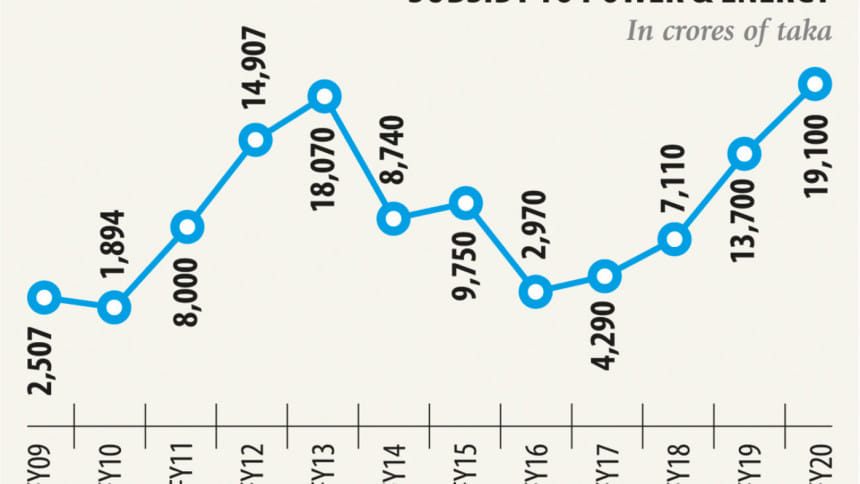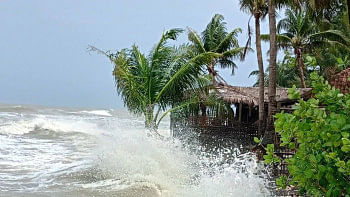Gas subsidy to double

Finance Minister AHM Mustafa Kamal yesterday proposed doubling the subsidy for the gas sector to Tk 9,600 crore for 2019-20, from Tk 4,500 crore in the previous year.
He also recommended setting aside Tk 9,500 crore as subsidy for the power sector for next fiscal year, up from Tk 9,200 crore in 2018-19.
In favour of the subsidies, he argued during his budget speech that the subsidies and transfer expenditure play an important role in achieving pro-poor and inclusive GDP growth.
The subsidy increase is down to the imports of liquefied natural gas (LNG) whose price is way higher than that of the locally produced gas.
The power sector has been the most successful sector for the Awami League-led government in the last one decade, driven by its emphasis on raising the generation capacity.
The results are encouraging: on May 29, Bangladesh produced 12,893 megawatts of electricity, the highest ever and a straight fourfold increase from what it was in 2009-10.
A staggering 93 percent people have access to power and the number of beneficiaries has doubled within a decade. Gas production stood at 3,000 million cubic feet of gas per day (mmcfd) on Wednesday, largely on the addition of the LNG in August last year. It was 1,744mmcfd in 2009.
"By next year, each upazila will have 100 percent access to electricity," the minister said.
But saying the same for the gas sector is still a far cry.
The country still has to wait for a long time for uninterrupted power and gas supply in spite of the recent inclusion of LNG to the national grid along with achieving a huge success in electricity generation in the last one decade.
Poor network for distribution and transmission of electricity and a high demand-supply gap of gas are to blame for the delay.
Consumers ranging from industries and power plants to fertiliser factories and households still complain of regular power outages.
The benefit of the progress in the energy and power sectors is not equally distributed: cities get almost uninterrupted power supply whereas villages still suffer from cuts.
Factories and producers based in the cities and industrial belts have access to gas and the same is true for the households in the same vicinity. But for the rest, getting a gas con-nection is a dream.
As the gas price has not been adjusted since the arrival of LNG, the government has spent Tk 14,000 crore from its coffer to facilitate LNG imports, Nasrul Hamid, state minister for energy and power, said in a programme in Dhaka on Sunday.
The finance minister allocated Tk 28,051 crore for the development of the power and energy sector, up from Tk 26,502 crore in 2018-19.
The power division received Tk 26,065 crore, up from Tk 24,212 crore in 2018-19 and the energy and mineral resources division got Tk 1,986 crore, down from Tk 2,290 crore in the outgoing fiscal year.
Hamid also talked about plans to set up land-based LNG and liquefied petroleum gas (LPG) terminals to improve gas supply. But it will take four to five years, he said.
The government's major plans lie in transmission and distribution systems, according to the state minister.
Two distribution projects were delayed by two years and now will take another three years to finish if their construction begins in the new fiscal year, meaning distribution related problems will persist for another three years.
Saleque Sufi, former director for operations at state-owned Gas Transmission Company Ltd, said the government has achieved visible success in increasing power generation manifold.
"But at the same time a major failure in exploitation of discovered own coal resource and exploration of hydrocarbon in onshore and offshore has created fuel supply crisis."
Also, the failure in harnessing the country's own primary fuel has increased its reliance on imported liquid fuel and LNG, he said.
"Very soon coal will be added to the import basket for power generation although the country is sitting on huge reserves of unexploited coal resources."
Coal reserves stand at 3,300 million tonnes -- equivalent to 78 trillion cubic feet (tcf) of natural gas. Gas reserve stands at 12.11 tcf.
"The government needs to take urgent political decision for exploiting own coal reserve and expediting exploration for petroleum," said Sufi, also an international energy consult-ant.
It would be a major challenge to aid energy imports by raising funds, said M Tamim, a professor of petroleum and mineral resources engineering at Bangladesh University of Engineering and Technology.
He urged the government to put more focus on developing the network for smooth transmission and distribution of the electricity that the country can now generate.
The professor also called for carrying out largescale exploration, both onshore and offshore, to find new gas.

 For all latest news, follow The Daily Star's Google News channel.
For all latest news, follow The Daily Star's Google News channel. 








Comments